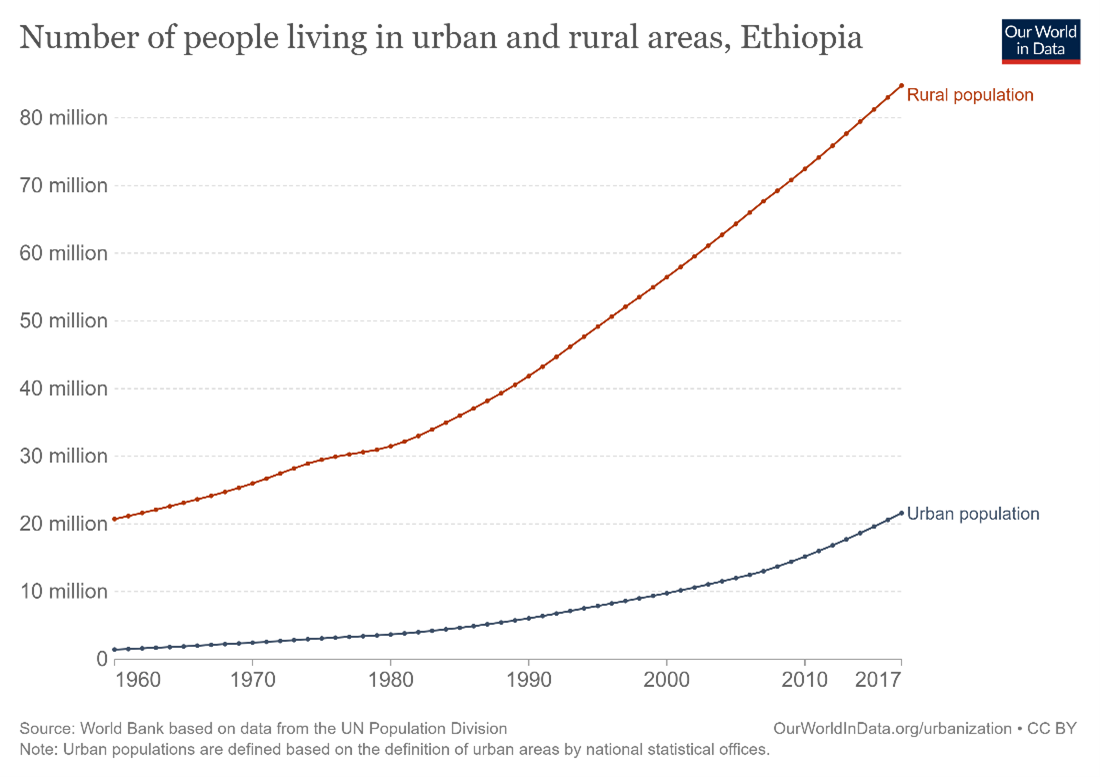Smart city initiative for a rapidly urbanizing eastern African city
August 29, 2022

Urbanisation in Ethiopia
Addis Ababa has been a vibrant city since its foundation, serving as Ethiopia's primary economic, social, and political centre for over 130 years. The city has witnessed several developments since its establishment as the capital, a driving force behind much of the continuous and linear population and urban expansion.
But such developments have not been satisfactorily documented to inform urban developers, researchers, policymakers, and citizens. In developing cities like Addis Ababa, with a fast-growing economy and very complex social problems arising from high population growth and many unsatisfied demands, it is becoming challenging for city administrators to solve many societal problems.
Throughout the years, the strain on infrastructure and urban footprint has meant that the city's development has lagged in delivering on demand for resources.
The information gap could have been filled by having a proper urban database that will enable us to obtain data and information on every smart city dimension and open it to the public and the private sector.
This lack of such an information centre has limited the participation of the different stakeholders in the generation of ideas and sourcing of urban-related data platforms for development planning.
Following this, the Accelerator Lab plans to focus on exploring how we might create a space for urban innovators that respond to citizens' needs for information, finance, and ideation, which can shape the 'smartness' of the city.
SMART CITY HUB
Globally, the concept of a smart city is becoming more and more relevant. Despite this development, confusion remains about what a smart city is, and the use of the term is inconsistent. The Smart City approach demands the storage of big data in one centre and a consistent approach to recording data. This will require investment in both technological infrastructure and the human capital to use it.
The African Smart Cities Strategies for Agenda 2063 elaborates on how cities can shape the continent's future and demonstrates that smarter cities can reduce urban challenges.
At the national level, Ethiopia has also launched 'smart city' efforts encompassing the four pillars of comprehensive development – institutional, physical, social, and economic infrastructure.
There is currently a continental push for 'smart cities' amongst the leadership to incorporate 'smart cities' into their urbanization strategies. This move means cities can tackle unplanned urbanization and high population growth challenges. The Addis Ababa city administration is aware of this challenge and plans to host a Smart City Hub establishment programme with the support of UNDP-Ethiopia.
The hub will provide a resource centre to support innovation in urban solutions and leverage already researched and successfully implemented work to facilitate sustainable urban development in the city. The hub will also act as a platform for urban-related data generation contributed by citizens and used by the government as a reliable source of feedback systems with its residents.
Nevertheless, before the hub establishment, a contextual understanding of a 'smart city' could yield a meaningful definition and comparison among Ethiopian cities.
What is Next?
The accelerator lab plans to host a series of collective intelligence sessions to understand the contextualized concept of 'smart city hubs' from resident and municipality perspectives. The insight from this exercise will guide thinking around what data and information, think tanks, and idea innovation could be integrated with the hub.
In addition, we will use participatory design to engage citizens as problem solvers. In order to create an interactive space, the data needs to be visualized and mapped in an engaging and easily consumable way.
This will allow us to see what type of information would be consumed and sought after. Questions include: Do our learning questions focus on how we can engage the community directly on the problem definition and ideation within the smart city hub? What type of infrastructure, information, and knowledge is needed/desired to set up the smart city hub? What type of partnerships and organizational structures are required?
This exercise will help to identify the overall pathways to developing a smart city hub.
We will be sharing our findings and what we learned in the next blog, but we would love to hear your comments and suggestion, so feel free to reach out on social media or at ethiopia.acclab@undp.org

 Locations
Locations
